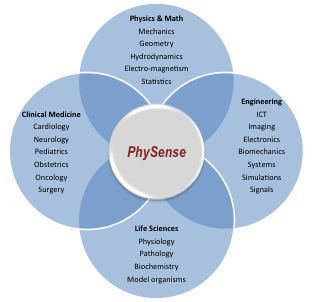Research
PhySense aims at contributing to translational biomedicine, promoting "reality-driven" research underlining the concept that direct human observations are essential for the study of hypotheses relevant to human reality [Mankoff S, Journal of Translational Medicine 2004].
Reality-driven biomedical research is accompanied by important hurdles since interpreting complex observations and linking these to relevant basic and clinical understanding of the human and their diseases requires an interaction of basic scientists from all disciplines, technologists and computer scientists and clinical specialists, all speaking different languages.

PhySense focuses on integrating engineering/physics/mathematics knowledge with physiology and clinical medicine in order to provide an interdisciplinary research environment, working closely together with internationally known academic clinical centres, both in Barcelona as well as in other cities and countries. This is approached by integrating and improving information acquisition, handling and processing techniques, as well as electronic devices, combined with basic knowledge on pathophysiology, in order to advance clinical sciences and the theoretical basis of engineering.
Therefore, the group provides methodologies and offers support for clinical and basic researchers:
- To help to define the research approach from the basic understanding of the disease towards the clinical study.
- To select/design the appropriate investigational tools to assess and measure the relevant clinical parameters.
- To quantify the diagnostic information (from clinical information to imaging data and biomedical signals)
- To extract the most pertinent information.
- To suggest and implement alternative approaches towards therapy and to interpret the results and relate them to the pathophysiological knowledge and clinical medicine.
